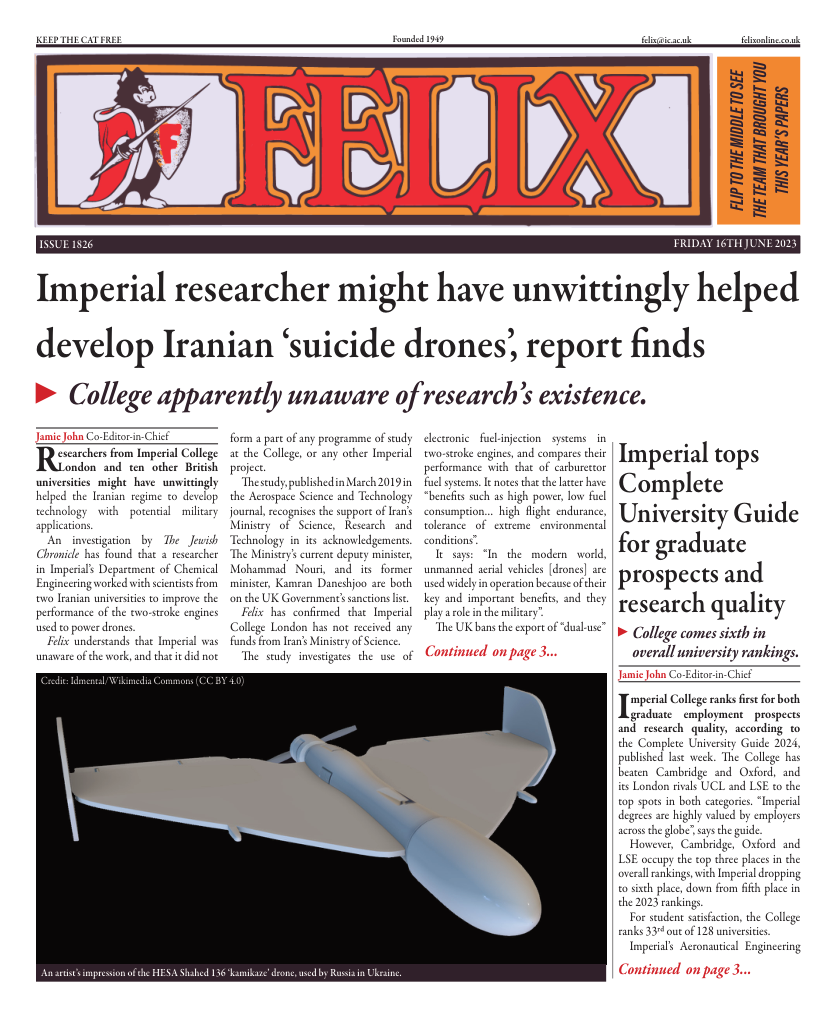Imperial researcher might have unwittingly helped develop Iranian ‘suicide drones’, report finds
College apparently unaware of research’s existence.

Researchers from Imperial College London and ten other British universities might have unwittingly helped the Iranian regime to develop technology with potential military applications.
An investigation by The Jewish Chronicle has found that a researcher in Imperial’s Department of Chemical Engineering worked with scientists from two Iranian universities to improve the performance of the two-stroke engines used to power drones.
Felix understands that Imperial was unaware of the work, and that it did not form a part of any programme of study at the College, or any other Imperial project.
The study, published in March 2019 in the Aerospace Science and Technology journal, recognises the support of Iran’s Ministry of Science, Research and Technology in its acknowledgements. The Ministry’s current deputy minister, Mohammad Nouri, and its former minister, Kamran Daneshjoo are both on the UK Government’s sanctions list.
Felix has confirmed that Imperial College London has not received any funds from Iran’s Ministry of Science.
The study investigates the use of electronic fuel-injection systems in two-stroke engines, and compares their performance with that of carburettor fuel systems. It notes that the latter have “benefits such as high power, low fuel consumption… high flight endurance, tolerance of extreme environmental conditions”.
It says: “In the modern world, unmanned aerial vehicles [drones] are used widely in operation because of their key and important benefits, and they play a role in the military”.
The UK bans the export of “dual-use” technology – which can be used for both civilian and military purposes – to Iran, or anyone “connected” with the state.
There is no suggestion that the researcher in question intended to aid the Iranian state. However, the study could have significant military applications, according to Farzin Nadimi, an expert on Iran’s military, and a senior fellow at the Washington Institute.
“Almost all Iranian drones are powered by two-stroke engines, including the Shahed-136, which is extensively used in the Ukrainian war”, he told The Jewish Chronicle. The Iranian HESA Shahed 136 ‘kamikaze’ drone entered service in 2021. In October 2022, the UK Government imposed sanctions on Iranians responsible for supplying Russia with the drones.
Nadimi went on to say that since the mid-1980s, Iran’s universities have played a “significant role” in its drone warfare programme.
The Chronicle says it has unearthed hundreds of other papers, in which researchers at UK universities have collaborated with Iranian universities under sanction by the Government. Among them, alleges the Chronicle, is a paper co-authored by researchers from Imperial, Liverpool, and Sharif University in Iran, on the use of lasers to manufacture “high value added parts [sic]” made from titanium alloy for the aerospace industry.
MPs have expressed concerns over the findings. “It is quite possible these collaborations are assisting in the gender apartheid within Iran, and its hostile interference and violence across the Middle East or even helping to massacre civilians in Ukraine”, said Alicia Kearns MP, chair of the Commons Select Committee on Foreign Affairs.
An Imperial College London spokesperson said: “All Imperial research is subject to Imperial's Ethics Code and we have robust relationship review policies and due diligence processes in place, with our responsibility to UK national security given the utmost importance.”
This is not the first time the College’s researchers have come under scrutiny for their work with sanctioned states. In December 2022, Felix reported that an Imperial professor co-founded a firm implicated in facilitating the tracking and profiling of the public by the Chinese government.
In September 2022, The Times reported that the College had shut down two research laboratories funded by Chinese defence companies, after the Government refused to grant export licences for their work. This followed an earlier Times investigation in February of that year, which found that Imperial had accepted £55 million from Chinese institutions, including £5 million from companies under sanction by the USA.









